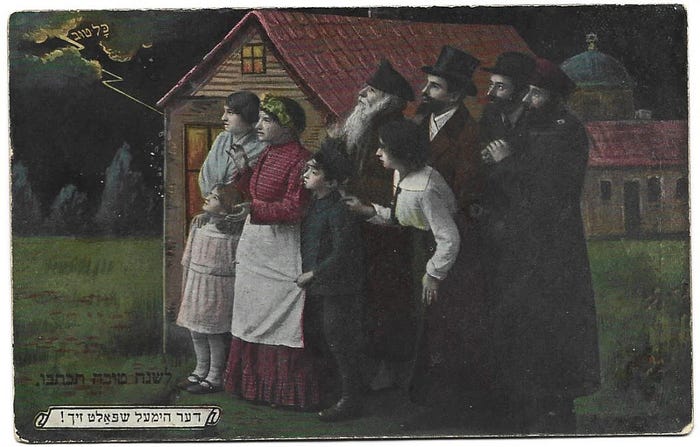

Zany Misadventures in Identity Politics: Rosh Hashanah Edition
source link: https://barrydredze.medium.com/zany-misadventures-in-identity-politics-rosh-hashanah-edition-1b0356ca3f27
Go to the source link to view the article. You can view the picture content, updated content and better typesetting reading experience. If the link is broken, please click the button below to view the snapshot at that time.
Zany Misadventures in Identity Politics: Rosh Hashanah Edition

Yiddish new year postcard, circa 1910; reads “the sky has split!” (in the scroll) and in the storm cloud, “good things.” (via the Hidden Treasures project of the Board of Deputies of British Jews; from the collection of Doris Levinson)
We observed a new Hebrew calendar year, Rosh Hashanah, in this last Gregorian week of September 2022, hoping to be inscribed and sealed in the Book of Life for 5783.
While I am only about half an hour into the first episode of the Ken Burns PBS documentary The US and the Holocaust, I do not usually prefer to watch Holocaust movies. Having grown up on a headful of Holocaust curricula from my earliest years in Hebrew School, as important a lesson as it is, I do not enjoy burrowing into the images and narrative of Jews as civilization’s greatest victims. As a people, we have contributed way too much to have to dwell on our victimization or to rub their humiliation into the faces of the Gentile nations, mostly because resentment is an awful tincture that comes with a spite hangover. And it makes too many of us indifferent to stuff like the shooting of Palestinian kids, medics and reporters at the Gaza border, the West Bank and overall territories of the Palestinian Authority.
Yom HaShoah is the holiday during springtime in the Jewish calendar popularly translated from the Hebrew as “Holocaust Remembrance Day.” The literal translation of shoah is catastrophe, a much more accurate word to my taste. The Merriam-Webster dictionary defines holocaust initially as “a sacrifice consumed by fire” and in the Oxford dictionary’s secondary definition as “a Jewish sacrificial offering that is burned completely on an altar.”
In fact, these people were not “sacrificed” for anything but the bloodlust of sick bigots who thought of themselves and their kind as pure to the point of having to slaughter anyone else they considered otherwise impure. While the history has profound impacts on those individuals with the direct experience of the horror, the impact ripples out to the world and through generations.
Meanwhile, Democrats and Jewish organizations, including the Anti-Defamation League have recently continued slamming Michigan Democratic Rep. Rashida Tlaib for claiming that individuals cannot be considered progressive if they support Israel. The accusation, however, is a lie. Rep. Tlaib never made any such claim or said anything even close to that. In fact, what the first and only US Representative of Palestinian descent said was that one “cannot claim to hold progressive values yet back Israel’s apartheid government….”
The next day, Florida Democratic Rep. Debbie Wasserman Schultz tweeted “The outrageous progressive litmus test on Israel by Rashida Tlaib is nothing short of antisemitic.”
Anti-Defamation League CEO Jonathan Greenblatt tweeted out Rep. Tlaib, arguing that “In one sentence, [Tlaib] simultaneously tells American Jews that they need to pass an anti-Zionist litmus test to participate in progressive spaces even as she doubles down on her [hashtag]antisemitism by slandering Israel as an apartheid state.”
Taking issue with Israeli national policy, particularly concerning the brutal history of the Israeli-Palestinian conflict, should be difficult to reasonably argue as being antisemitism. To assert that it is somehow antisemitic to argue that Israeli military authority over non-Jews in areas under negotiation for Palestinian national self-determination while expanding Jewish settlement under Israeli civil law at the expense of Palestinian communities and territorial claims should be taken as absurdly cynical. Instead, we have a public discourse in the wake of a News business narrative that takes such specious arguments seriously.
One of the memorable World War II era partisan songs is “Zog Nit Keyn Mol,” a Yiddish anthem of Lithuanian Jewish partisans with lyrics including: “From lands so green with palms to lands all white with snow. We shall be coming with our anguish and our woe.” I have no problem with the sentiment for the struggle it confronts. It’s the anthem of a violence that comes from having nothing left to lose. We should have a better understanding for the Palestinians left stateless and thus out of the loop of basic human rights, because, as Hannah Arendt explains in her monumental postwar work The Origins of Totalitarianism, the Enlightenment revolutions’ Rights of Man are really little more than fantasy without the institutional structure of a state to enforce and protect them. And few peoples on this earth should understand this better than Jews. But “our anguish and our woe” have largely blinded us to that of our rivals for that land “so green with palms.”
At the time of this writing between Rosh Hashanah, the celebration of the Jewish new year, and Yom Kippur, the day of fasting and atonement, we traditionally meditate on our shortcomings in our behavior and our responsibilities for our dealings with others. The communal prayer of confession, al-khet shekhatanu, “for the sins we have committed…,” is a long list of common, real-world, character flaws that we all routinely commit in the course of a year. With a new year, we are supposed to concentrate on doing better. Between the items of the list, as a chorus to a song, we recite as a congregation, “For all these, God of pardon, pardon us, forgive us, atone for us.”
It is among my own hopes that at least Rep. Rashida Tlaib and her constituents would forgive our leadership for twisting her words and intentions into cynical arguments, ostensibly on behalf of all Jews.
Recommend
About Joyk
Aggregate valuable and interesting links.
Joyk means Joy of geeK